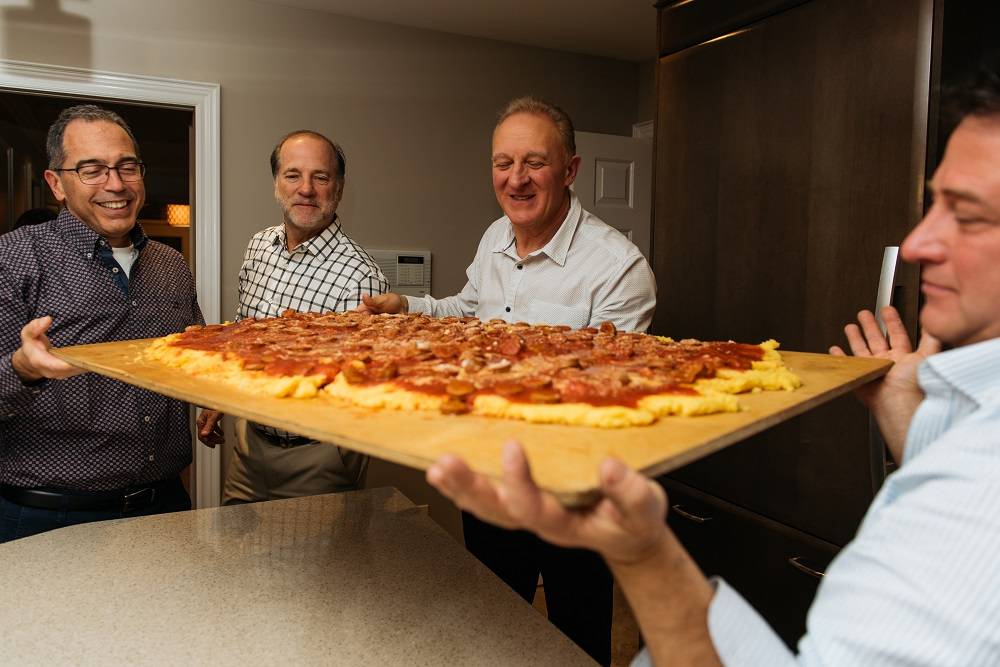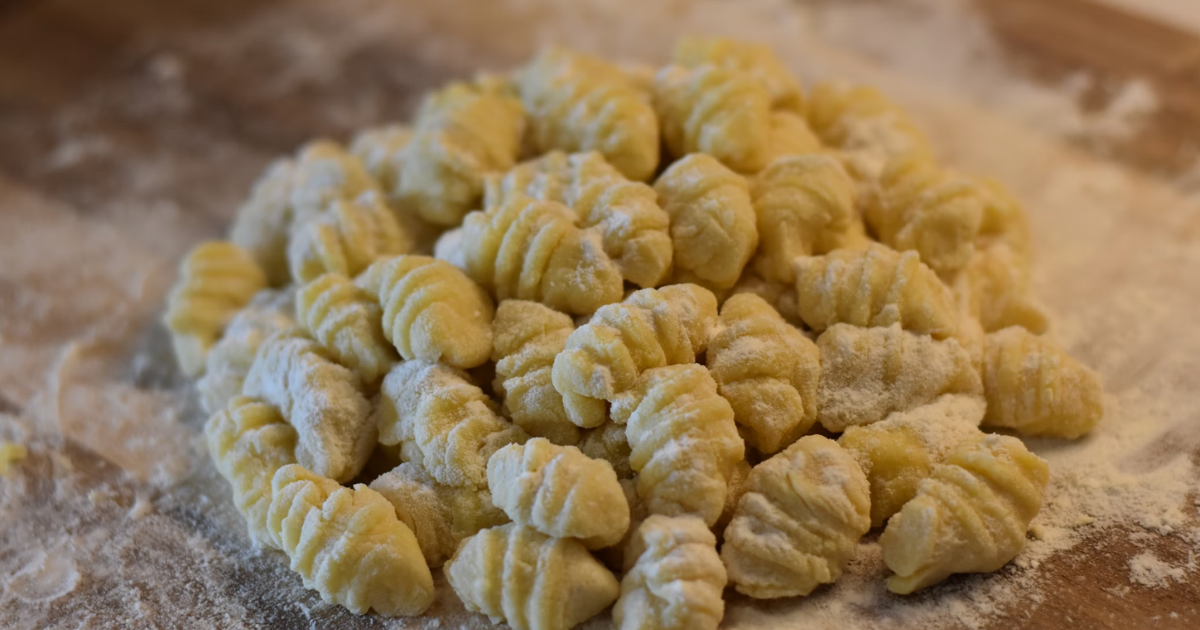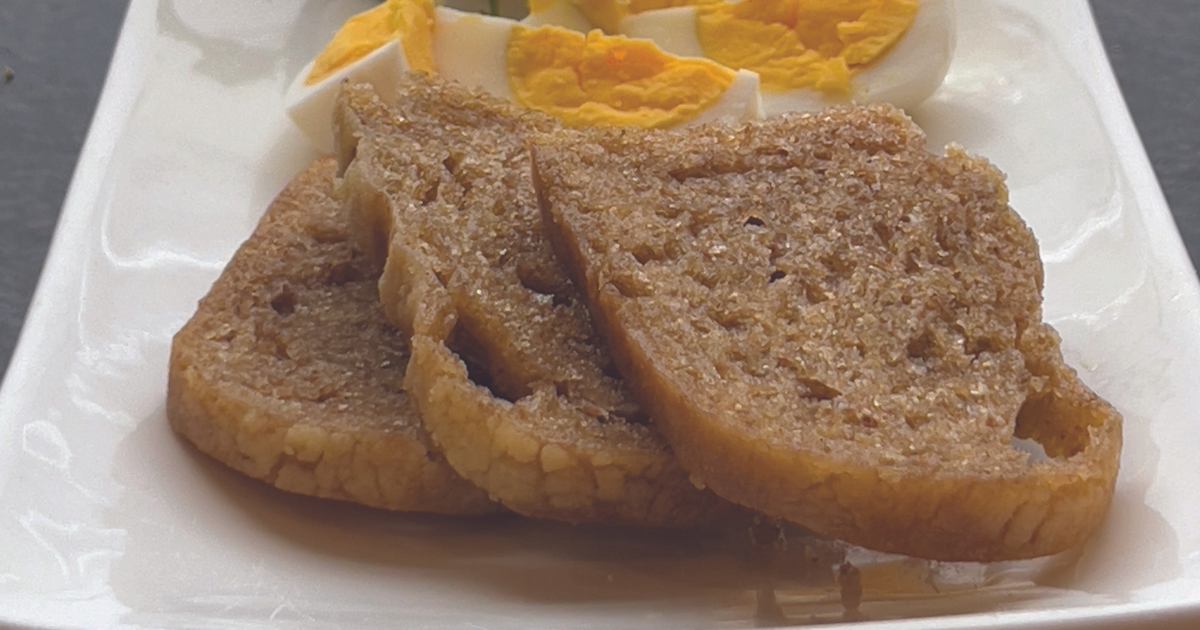Twenty years ago in Ancaster Meadows, located in the historic village of Ancaster, Ontario, a group of neighbours developed a friendship that started off much like any other. The neighbours had children in the same school and on the same sports teams, and they attended the same church. Over the years, their friendship has grown stronger thanks to shared interests in good food, good wine, good conversation—and polenta.

The friends, who call themselves the Polenta Gang, came together in the mid-1990s. They were originally five couples, with a sixth joining in later. Altogether, the Polenta Gang includes Steve and Dora Boccadoro, Lou and Tina DiDomenico, Carl and Carla Galli, Leanne and Randy Osatchuk, Rito and Maria Rosati, and Lisa and Frank Safian.
“Many of the couples grew up in the Hamilton area and have known each other for even longer,” says Lisa. “Carla Galli and Tina DiDomenico are cousins. We are all members of St. Ann’s Church, which meant our children attended the same elementary and secondary schools.”

The couples have all been married for 25 to 38 years and have two or three kids each. They all describe their children as being very central in their lives, although their kids are now grown and live throughout Ontario, Quebec and the U.S., explains Lisa.
“We all love to socialize, and our initial social get-togethers included barbecues, pool parties and all kinds of dinner parties,” says Leanne. “When everyone’s kids still lived at home, they were always included, so there was a big group of us constantly between each other’s homes.” Polenta came into the picture after a conversation led to the discovery that the only non-Italian couple, Lisa and Frank, didn’t know much about this Italian staple, which is essentially boiled cornmeal. Rito quickly filled them in on how polenta is typically served on a large wooden board and topped with a hearty sauce. The others shared stories of how their own mothers and nonnas prepared and served the dish.

“At that moment, we decided that our next get-together would be a polenta dinner party,” says Rito. “We found a wooden board large enough to cover a dining room table, and we had our first polenta night in 1999. It was a such a great success, we decided to make it an annual event.” Polenta Night roles and traditions emerged over the years. The event takes place each winter and rotates between homes. The same board is always used. Each year, the host couple sign and date the back of the board. It has become tradition and it helps the group remember who is hosting next.
The host family always takes great pride in making the sauce. For Lisa and Frank’s first hosting night, however, Rito offered to make the sauce and they gladly accepted.

“Since then, whenever it’s our turn to host, we have made the sauce ourselves,” says Frank. “The rest of the group, who are all Italian, agree that it’s always been delizioso!”
Of course, like all Italian celebrations, Polenta Night is not a one-course dinner. Everyone contributes to the meal, which includes an array of appetizers, salad, vegetables and desserts. When the gang’s kids used to attend, they weren’t all fond of polenta, so there was always pasta and meatballs, too.
Each year, the women prepare these dishes ahead of time, meaning they get to enjoy a glass of wine while the men toil over the stove, cooking the polenta. At times, all six men are at the stove, stirring the large pot of polenta—although one would suffice. There’s a mandatory photo shoot of the men in action each year.
In the early years of Polenta Night, the men made a simple cornmeal, which took considerable time and muscle to stir to the desired consistency. The first year, not being sure how much cornmeal was needed, they purchased a 40-kg bag. It turned out that only a few cups were required, so the rest was packed in small bags and Maria and Rito handed it out to the polenta kids as a joke at Halloween.
The quantity has since been scaled back, and the group has experimented with a variety of imported cornmeal from Italy. Recently, they switched to instant polenta to ease up on the work required of the polenta men.

Another new tradition that has been added along the way is a polenta procession.
“Once the polenta is ready, it’s poured onto the board and covered with sauce and sausages,” says Randy. “The men carry it through the host’s kitchen and dining room, banging pots and pans to music. I then make a toast to our collective health and friendship—and it’s time to dig in!” A fun element of the evening involves attempting to carve the shape of Italy out of the polenta remaining on the board as each guest serves themselves.
“It usually ends up looking more like Australia,” jokes Lou.
After dinner, it’s time for some friendly competition. About five years ago, the Cornmeal Cup was introduced. The coveted Cup is a bomboniere (a wedding favour) that’s passed along each year to the couple who wins a friendly trivia competition. The trivia theme changes each year (they’ve covered the origins of polenta, the World Cup and the Olympics), and the winning couple gets to keep the Cornmeal Cup for the year and create the trivia quiz for the following year. “We look forward to our yearly polenta dinner party in the cold and dark days of our Canadian winter (typically taking place in February or March),” says Maria. “The food is always delicious, but it’s about so much more than that. The friendships that have been developed and sustained over the years are priceless. We have shared many moments together, some happy and some very challenging, like illness and the loss of loved family members. No doubt we will continue to share those moments together.”

Although the gang’s Polenta Night is only held once a year, the group shares many other celebrations and milestones at their homes and at restaurants and weddings.
“We are a group with strong shared values of family, friendship and faith,” says Carla. “Over the years, we have seen each other’s children grow and become successful adults who share these same values.”
The Polenta Gang also travels together. A trip to Las Vegas (July 2014) included a memorable polenta dinner at an Italian restaurant, and the friends also spent a weekend away at a Paul Anka concert (April 2015)—Rito is his No. 1 fan.

This past summer, to celebrate their 20th year together, the members travelled to the beautiful Amalfi Coast in Italy. “Unfortunately, the Boccadoros [Steve and Dora] had a conflict and could not join the group for the Italy trip. We all missed them,” says Tina. “While in Italy, we all purchased a souvenir ceramic tile, which we will use as centrepieces for bistro tables that we will be making under the artistic guidance of Randy Osatchuk, who is a retired art teacher. Fellow Polentonian and owner of Modern Ornamental Ironworks Rito Rosati has kindly offered to make the base of the tables for the group.”
“Since we have lived out of the country for several years, during these last 20 years of making polenta we are so grateful to enjoy the polenta and the gang when we have returned home,” says Dora. “Even though we have been absent for several occasions, we are part of the polenta group because everyone is so warm and welcoming, which is just what a polenta meal offers, as well!” While the group didn’t have a chance to sample polenta on their recent trip to Italy, they can still look forward to enjoying many more gatherings around the classic dish for years to come.

Polenta is a dish of boiled cornmeal that was historically made from other grains. It may be served as a hot porridge, or it may be allowed to cool and solidify into a loaf that can be baked, fried, or grilled.
An editor with 15-plus years in the publishing business, Catalina Margulis’ byline spans travel, food, decor, parenting, fashion, beauty, health and business. When she’s not chasing after her three young children, she can be found painting her home, taming her garden and baking muffins.












